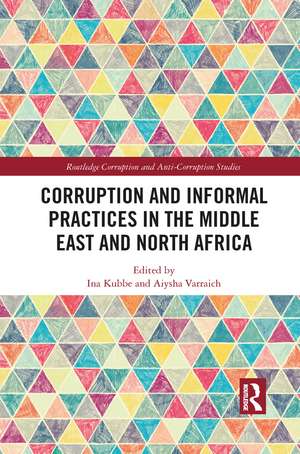Corruption and Informal Practices in the Middle East and North Africa: Routledge Corruption and Anti-Corruption Studies
Editat de Ina Kubbe, Aiysha Varraichen Limba Engleză Paperback – 2 aug 2021
When informal practices become vehicles for corruption, they can have negative ripple effects across many aspects of society, but on the other hand, informal practices could also have the potential to be leveraged to reinforce formal institutions to help fight corruption. Drawing on a range of cases including Morocco, Lebanon, Turkey, Jordan, Tunisia or Israel the book first explores the mechanisms and dynamics of corruption and informal practices in the region, before looking at the successes and failures of anti-corruption initiatives. The final section focuses on gender perspectives on corruption, which are often overlooked in corruption literature, and the role of women in the Middle East.
With insights drawn from a range of disciplines, this book will be of interest to researchers and students across political science, philosophy, socio-legal studies, public administration, and Middle Eastern studies, as well as to policy makers and practitioners working in the region.
| Toate formatele și edițiile | Preț | Express |
|---|---|---|
| Paperback (1) | 386.00 lei 6-8 săpt. | |
| Taylor & Francis – 2 aug 2021 | 386.00 lei 6-8 săpt. | |
| Hardback (1) | 1001.90 lei 6-8 săpt. | |
| Taylor & Francis – 18 dec 2019 | 1001.90 lei 6-8 săpt. |
Preț: 386.00 lei
Nou
Puncte Express: 579
Preț estimativ în valută:
73.88€ • 76.14$ • 62.37£
73.88€ • 76.14$ • 62.37£
Carte tipărită la comandă
Livrare economică 01-15 martie
Preluare comenzi: 021 569.72.76
Specificații
ISBN-13: 9781032082899
ISBN-10: 1032082895
Pagini: 252
Ilustrații: 17 Illustrations, black and white
Dimensiuni: 156 x 234 x 13 mm
Greutate: 0.37 kg
Ediția:1
Editura: Taylor & Francis
Colecția Routledge
Seria Routledge Corruption and Anti-Corruption Studies
Locul publicării:Oxford, United Kingdom
ISBN-10: 1032082895
Pagini: 252
Ilustrații: 17 Illustrations, black and white
Dimensiuni: 156 x 234 x 13 mm
Greutate: 0.37 kg
Ediția:1
Editura: Taylor & Francis
Colecția Routledge
Seria Routledge Corruption and Anti-Corruption Studies
Locul publicării:Oxford, United Kingdom
Public țintă
Postgraduate and ProfessionalCuprins
Introduction Part 1: Conceptualising the Mechanisms and Dynamics of Corruption and Informal Practices in the MENA region 1. Dispersing the Fog: A Philosophical Analysis of Institutional Corruption Applied to the MENA region 2.Hamulas and Structural Corruption in The Middle East 3. Assessing the Impact of Sectarian Patronage in Lebanon 4. Does Wasta Undermine Support for Democracy? Corruption, Clientelism, and Attitudes toward Political Regimes Part 2: Successes and Failures of Anti-corruption Initiatives 5. Sweeping under the Rug: The Limitations and Failures of the Formal Fight Against Corruption in Morocco 6. Old Wine in New Bottles? Corruption and Neopatrimonial Statehood in Turkey 7. "Corruption Eruption"? The Israeli Case Part 3: The Way Forward – Empowering women as a Tool to reduce corruption 8. Is Poor Performance in Gender Equality Linked to Higher Corruption in the Middle East? 9. Women, Corruption, and Wasta in Jordan – A Case Study in Female Elected Representatives 10. Between Leadership and Kinship: Women Empowerment in the GCC Countries 11.Support for Gender Quotas and Perceived Corruption in Developing Democracies: Evidence from Lebanon Conclusion and Future Prospects
Notă biografică
Ina Kubbe, Post-Doctoral Researcher, The School of Political Science, Government and International Affairs, Tel Aviv University, Israel.
Aiysha Varraich, PhD Candidate, Quality of Government Institute, Department of Political Science, University of Gothenburg, Sweden.
Aiysha Varraich, PhD Candidate, Quality of Government Institute, Department of Political Science, University of Gothenburg, Sweden.
Recenzii
"This volume is destined to become an instant classic on corruption and informal practices in the MENA region. Leading authorities shed light on lies beyond the shadows." -- Robert Looney, Distinguished Professor at the Naval Postgraduate School, Monterey, California, USA.
"In this innovative collection, a new generation of scholarship finds a way of disaggregating the umbrella term of ‘corruption’ for the purposes of precision in study and policy-making in the Middle East and Northern Africa. They focus on the sensitive issues as to whether, and at which point informal practices, widely adopted and often associated with culture, actually turn into corruption. The book sheds light on why some anti-corruption strategies have worked and others have not, and explores the potential of empowering women and facilitating the use of personal networks, thus integrating ‘what works’ into the anti-corruption policy implementation and offering context-sensitive solutions to the persistent issues in the region." -- Alena Ledeneva, Founder of the Global Informality Project, Professor of Politics and Society, UCL, United Kingdom
"In this innovative collection, a new generation of scholarship finds a way of disaggregating the umbrella term of ‘corruption’ for the purposes of precision in study and policy-making in the Middle East and Northern Africa. They focus on the sensitive issues as to whether, and at which point informal practices, widely adopted and often associated with culture, actually turn into corruption. The book sheds light on why some anti-corruption strategies have worked and others have not, and explores the potential of empowering women and facilitating the use of personal networks, thus integrating ‘what works’ into the anti-corruption policy implementation and offering context-sensitive solutions to the persistent issues in the region." -- Alena Ledeneva, Founder of the Global Informality Project, Professor of Politics and Society, UCL, United Kingdom
Descriere
This book investigates the pervasive problem of corruption across the Middle East and North Africa. This book explores how corruption in the Middle East and North Africa is actuated through informal practices that coexist and work in parallel to formal institutions.















